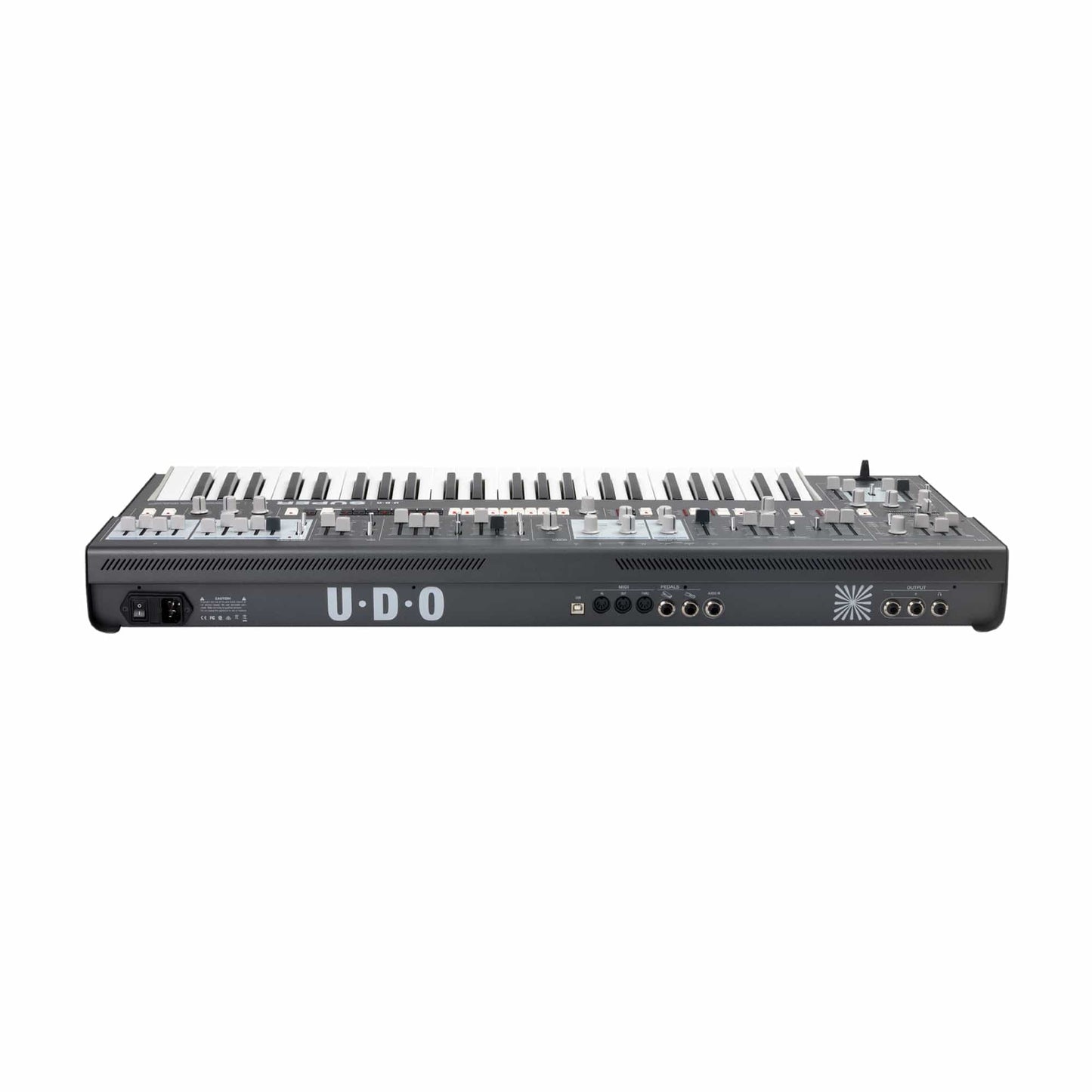This item is currently out of stock, but don't fret! We have a lot of synthesizers in stock. Shop Now



Description
Description
The Super 6 is a 12-voice polyphonic analog-hybrid synthesizer. A harmonious marriage of state-of-the-art FPGA digital hardware oscillators and voltage-controlled analog technology. It is flexible, immediate, powerful and refined with a gorgeous analog tone. Rich and evolving textures are easily teased from the unique Super-wave core and can be shaped and manipulated with the binaural analog signal path and flexible modulation capabilities. Robust, compact and versatile with solid and responsive controls – the Super 6 is a truly vibrant and inviting instrument that cries out to be played.
Oscillators
The Super 6 features two main FPGA-based oscillators per voice
DDS 1 (Oscillator 1)
FPGA-based Super-wave oscillator core sampled at 50MHz with a centroid oscillator and six sister oscillators that can be dynamically de-phased in the stereo field.
Waveshapes: sine, sawtooth, square, triangle, noise and 16 user-downloadable alternative waveforms
DDS 2 (Oscillator 2)
FPGA-based algorithmic oscillator core sampled at 50MHz
Waveshapes: sine, sawtooth, square, triangle, noise, pulse
DDS Modulators
Audio Input
LFO 1
Mixer
Voltage Controlled Filter
The SSI2144 reprises the SSM2044 of legacy chipmaker Solid State Micro Technology, which many believe to be the best-sounding analog synthesis filter IC ever produced. Based on Dave Rossum’s patented classic improved ladder topology, the SSI2144 allows rich tonal characteristics that showcase the very best attributes of subtractive synthesis.
Voltage Controlled Amplifier
Envelopes
ENV 1: Invertible Hold-Attack-Decay-Sustain-Release, mappable through modulation matrix
Looping mode with selectable keyboard tracking for use as an LFO or FM source
ENV 2: Attack-Decay-Sustain-Release, multiple destinations
Keyboard and Controller Section
Modulation Matrix
Arpeggiator/Sequencer
Effects
Performance
IO Connections
Integration
What is Binaural Synthesis?
In Binaural mode, the Super 6 features a true stereo signal path in which its twelve voices are twinned to form six stereo ‘Super’ voices. Consequently, the left and right channels, and each your ears, are assigned a complete synthesizer voice. Starting with the stereo oscillators, parameters of both channels of each Super voice may be independently controlled, facilitating you the player to create gorgeous stereo images. The effect on the sound ranges from subtle to extreme stereo movement and an enhanced sense of spatial positioning relative to conventional monaural signal-chains.
- 12-voice polyphonic, analog-hybrid synthesizer
- 49-key Fatar keyboard with velocity and aftertouch
- Binaural analog signal path for stereo movement and spatial effects
- 7-core Super-wave main oscillator with waveform download
- Second oscillator with FM, sync, sub oscillator and crossfade modes
- Flexible, hybrid FPGA & analog voice architecture
- Robustly built with solid, playable controls
- Multi-purpose, flexible LFOs, envelopes & modulation matrix
- Arpeggiator & step sequencer
- External audio input with threshold-based envelope and LFO triggering
- Dual stereo 24-bit digital effects
- 128 rewritable patch storage locations
- MPE controllable
Oscillators
The Super 6 features two main FPGA-based oscillators per voice
DDS 1 (Oscillator 1)
FPGA-based Super-wave oscillator core sampled at 50MHz with a centroid oscillator and six sister oscillators that can be dynamically de-phased in the stereo field.
Waveshapes: sine, sawtooth, square, triangle, noise and 16 user-downloadable alternative waveforms
- Alternative DDS 1 waveform format:
- Normalized, single-cycle waveform with 4096 points
- 16-bit signed integer format samples
- Bandlimited at sampling frequency/8 (Nyquist/4). If 4096 Hz is your sampling frequency, then 512 Hz is the upper limit of your passband.
- Binary file with no header data and file extension .ws6
DDS 2 (Oscillator 2)
FPGA-based algorithmic oscillator core sampled at 50MHz
Waveshapes: sine, sawtooth, square, triangle, noise, pulse
- Can be hard-synced to DDS 1
- LFO mode
- Sub oscillator mode (can be activated when in LFO mode)
- Pulse waveform with variable pulse width and PWM
DDS Modulators
- LFO and envelope modulation of DDS 1 & DDS 2 pitch
- Selectable ½ Super or full Super mode for DDS 1
- Sister oscillator detune spread control for Super waves
- Pulse-width control for pulse waveform
- LFO and/or ENV 1 can modulate the sister oscillator detune spread for the Super waves and the pulse-width for the standard waves
- DDS 2 to DDS 1 cross-modulation for deep FM Sounds
Audio Input
- Stereo audio input that feeds through the VCA, VCF and effects section
- Gate triggering of envelopes and LFO 1 based on audio input level with a variable-gain input stage
LFO 1
- Main LFO with low and high-frequency modes, rate adjustable from 0.05 Hz to 20 kHz
- Left-right phase control for stereo effects, harnessing the binaural sound engine
- Can be free-running or reset on note press
- One-shot mode allows LFO 1 to act as an additional envelope
- Keyboard tracking mode for high-frequency LFO (useful for FM sounds)
- LFO 1 can be mapped through the DDS 1 or DDS 2 audio path in either fixed or tracking high-frequency modes for use as a drone or a third oscillator
- Can be synchronized with the sequencer and arpeggiator as well as an external clock
Mixer
- Adjusts the mix-level of DDS 1 and DDS 2 audio signals
- When in X-Fade mode, adjusts split point on the keyboard of crossfaded DDS 1 and DDS 2 (or audio input) signals
Voltage Controlled Filter
The SSI2144 reprises the SSM2044 of legacy chipmaker Solid State Micro Technology, which many believe to be the best-sounding analog synthesis filter IC ever produced. Based on Dave Rossum’s patented classic improved ladder topology, the SSI2144 allows rich tonal characteristics that showcase the very best attributes of subtractive synthesis.
- Analogue 4-pole low pass self-resonant filter
- Two levels of overdrive
- High pass filter with fixed frequency or linked to low pass filter for a bandpass response
- Selectable keyboard tracking modes with filter autotune for accurate keyboard tracking
- Modulation by ENV 1 and/or ENV 2, LFO 1 and DDS 2
Voltage Controlled Amplifier
- Analogue VCA with selectable fixed or variable envelope (ENV 2) modulation
- LFO 1 modulation
- Dynamics control for selectable velocity sensitivity
Envelopes
ENV 1: Invertible Hold-Attack-Decay-Sustain-Release, mappable through modulation matrix
Looping mode with selectable keyboard tracking for use as an LFO or FM source
ENV 2: Attack-Decay-Sustain-Release, multiple destinations
Keyboard and Controller Section
- 49-key Fatar mechanism with velocity and aftertouch
- Two-axis bender with LFO trigger
- Voice modes: Poly 1, Poly 2, Solo, Legato, variable size and type Unison
- Keyboard-adjacent dedicated controls for bender DDS 1/2 pitch and VCF cutoff modulation
- LFO 2 with rate and delay controls, selectable triggered and always-on modes
- Variable portamento
- Expression pedal and sustain pedal inputs
- Playable spring-lever keyboard octave selector
- MPE MIDI compliance with response to note on and off velocity, polyphonic aftertouch, polyphonic pitch bend and polyphonic expression
Modulation Matrix
- Intuitive modulation matrix with pre-defined destinations and also mapping to a wide range of front panel controls
- LEDs give clear feedback on mappings and modulation depths
- 20x audio-rate modulation computation
Arpeggiator/Sequencer
- MIDI-syncable, multi-mode arpeggiator with smart-hold
- MIDI-syncable 64-step sequencer with programmable note, rest, slide, accent and length tracks
- LFO 1 and delay controls can be locked to the arpeggiator/sequencer clock
- 16 rewritable memory locations for storing sequences
Effects
- Dual-mode stereo chorus using 24-bit 192 kHz processing
- Syncable and modulatable stereo delay with 24-bit 192 kHz processing
Performance
- 128 rewriteable patch memories with 64 factory patches and 64 empty slots for user patches
- Superior build quality, easy access buttons, sliders, knobs and a menu-free interface
IO Connections
- MIDI in, out and thru on DIN connectors
- USB IO for MIDI and patch, sequence and waveform management
- Audio input for stereo ¼” jack
- Main left and right outputs for unbalanced ¼” jacks
- High-quality stereo headphone power amplifier
Integration
- Easy file upload and download of patches, sequences and waveforms via simple USB ‘memory stick’ type interface with no extra drivers or applications required
- Easy OS upgrade over USB
What is Binaural Synthesis?
In Binaural mode, the Super 6 features a true stereo signal path in which its twelve voices are twinned to form six stereo ‘Super’ voices. Consequently, the left and right channels, and each your ears, are assigned a complete synthesizer voice. Starting with the stereo oscillators, parameters of both channels of each Super voice may be independently controlled, facilitating you the player to create gorgeous stereo images. The effect on the sound ranges from subtle to extreme stereo movement and an enhanced sense of spatial positioning relative to conventional monaural signal-chains.



